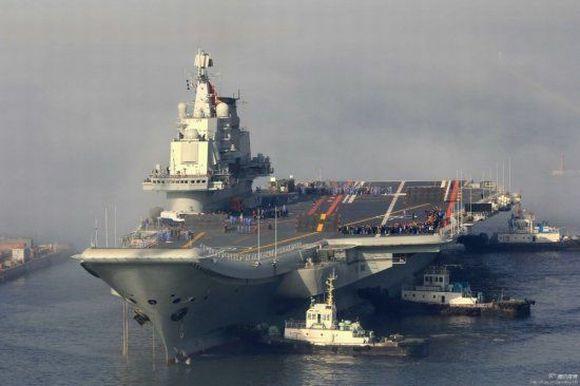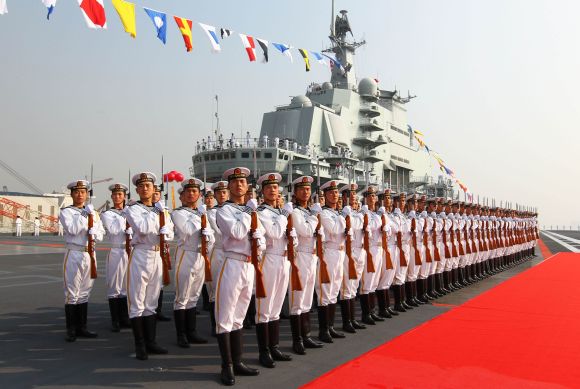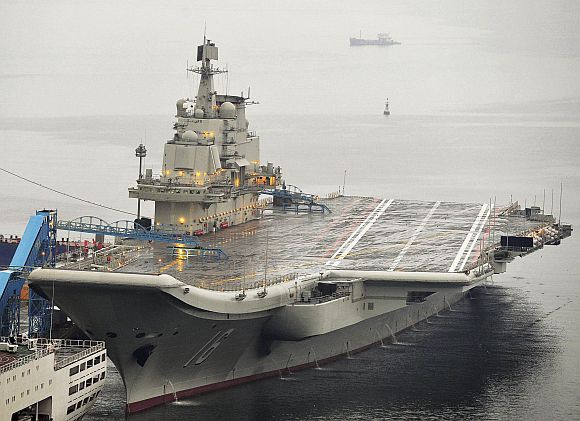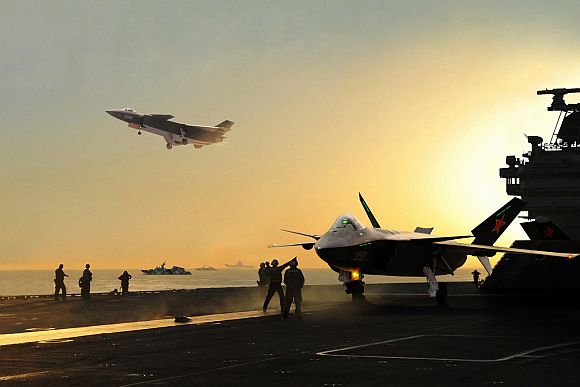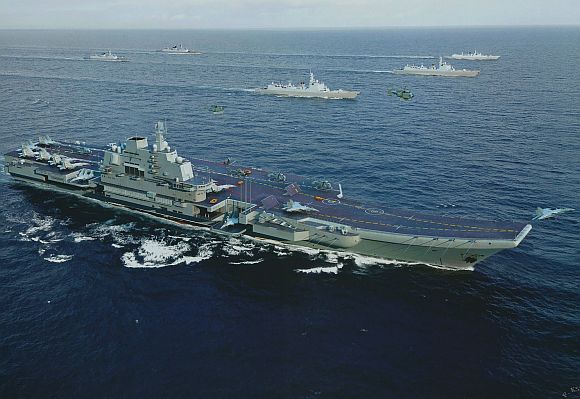 | « Back to article | Print this article |
China gets its first aircraft carrier amidst tensions with Japan
China on Tuesday launched its first aircraft carrier, propelling its fast expanding navy's blue-water capability beyond its territorial waters at a time when the neighbourhood is witnessing high-voltage tensions in Sino-Japan ties.
The 60,000 tonne carrier, a former Soviet ship brought from Ukraine and later refurbished locally is named 'Liaoning', after a Chinese province liberated from Japanese occupation in 1945, in what can be seen as another symbolic warning to Tokyo.
China's ties with Japan have plunged over an escalating diplomatic row over disputed islands in the East China Sea, and the country remains embroiled in a number of disputes with countries like the Philippines and Vietnam in the resource-rich South China Sea.
The 300-metre carrier would raise the overall operational strength of the Chinese navy and help China to effectively protect national sovereignty, security and development interests, the defence ministry said in a statement.
Click on NEXT to read further...
China gets its first aircraft carrier
The carrier is capable of accommodating 33 fixed wing aircraft, according to the official media in Beijing.
China says it is an experimental carrier and plans to construct three more.
According to earlier reports China will be deploying J-15 fighters, stated to be a home made variant of Russia's Su-33 to operate from the carrier.
The carrier, formerly known as the Soviet ship Varyag, underwent about seven years of refitting efforts to install engines, weapons, as well as a year-long sea trial.
With its commencement China has become the tenth country in the world and the last among the five permanent members of the UN Security Council to have an aircraft carrier in active service.
Click on NEXT to read further...
China gets its first aircraft carrier
The defence ministry said the vessel will increase China's capacity to defend itself and "cooperate on the high seas in dealing with non-traditional security threats".
The handing over ceremony was overseen by President Hu Jintao and Premier Wen Jiabao at a naval base in northeast China's city of Dalian. Both the leaders will be retiring by the end of this year.
Hu, who is also chairman of the Central Military Commission (CMC), endorsed a PLA flag and naming certificate to the naval unit that received the carrier.
The ship will "be of great and far-reaching significance in inspiring patriotism, national spirit and driving national defence technologies," Wen said, according to state-run Xinhua news agency.
"It will also be of great significance in enhancing national defence power and the country's comprehensive strength," Wen said.
Click on NEXT to read further...
China gets its first aircraft carrier
"China's development of an aircraft carrier was an important strategic decision made by the Communist Party of China (CPC) Central Committee, the State Council and the Central Military Commission," Wen said.
"The delivery and commission of the first carrier is a milestone in the PLA's history and embodies a major achievement of China's weaponry and equipment development, as well as its national defense modernisation," he said.
After the commission ceremony, Hu boarded the Liaoning, which was in full dress, and inspected the Navy's guard of honour.
The two leaders later came to the carrier's flight deck and went around cabins where they interacted with sailors, scientists and engineers who developed the carrier.
According to the CMC, after being commissioned to the Navy, the Liaoning will continue to serve for scientific research purposes as well as military training.
Click on NEXT to read further...
China gets its first aircraft carrier
In a separate commentary, Xinhua said the carrier poses no threat to world peace.
The aircraft carrier, 'Liaoning', is a landmark in the country's modernisation of armed forces and national defence and poses no threat to other countries, it said.
The commentary pointed out that China had more than 18,000 km of coastline and three million square km of territorial waters and the carrier was a reasonable choice.
China will not join any arms race, pose a threat to other countries or exceed its national and economic strength to develop arms, it said.
"There is no need of panic about whether China has an aircraft carrier or how many aircraft carriers it will have," the commentary said.
